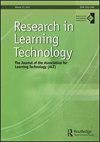在线发展弹性:菲律宾大学生同步与非同步弹性干预的评估
IF 1.2
Q2 EDUCATION & EDUCATIONAL RESEARCH
引用次数: 0
摘要
本研究评估了2019冠状病毒病大流行期间大学生韧性干预的两种形式。利用随机对照试验设计,研究了同步和异步弹性干预与进行日志干预的对照组的影响。测量的结果包括应对行为、无反应性、幸福感、压力、抑郁和焦虑。研究对象为菲律宾大学生,随机分为三组:同步在线弹性组(n = 135)、异步在线弹性组(n = 121)和对照组(n = 127)。结果显示,与那些经历了异步干预的学生相比,经历了在线同步弹性的学生在干预后的抑郁程度显著降低。与非同步组和记录组相比,同步组的干预后无反应性得分也更高。效应量从小到中等。这项研究表明,在线弹性干预是解决学生心理健康需求的可行手段,特别是在心理健康资源有限的国家。本文章由计算机程序翻译,如有差异,请以英文原文为准。
Developing resilience online: Evaluation of synchronous and asynchronous resilience interventions for Filipino college students
This study evaluated two forms of a resilience intervention amongst college students during the COVID-19 pandemic. Utilising a randomised controlled trial design, it examined the impact of a synchronous and asynchronous resilience interventions versus a control group that did a journaling intervention. Outcomes measured included coping behaviour, non-reactivity, wellbeing, stress, depression and anxiety. Participants consisted of Filipino college students randomly assigned to three groups: synchronous online resilience group (n = 135), asynchronous resilience group (n = 121) and control group (n = 127). Results revealed that students who went through the online synchronous resilience reported a significant reduction in depression at post-intervention compared to those who went through an asynchronous intervention. Post-intervention scores for nonreactivity were also higher in the synchronous group compared to both asynchronous and journaling groups. Effect sizes were small to moderate. This study suggests that online resilience interventions are viable means to address the mental health needs of students, especially in countries with limited mental health resources.
求助全文
通过发布文献求助,成功后即可免费获取论文全文。
去求助
来源期刊

Research in Learning Technology
EDUCATION & EDUCATIONAL RESEARCH-
CiteScore
6.50
自引率
0.00%
发文量
13
审稿时长
20 weeks
 求助内容:
求助内容: 应助结果提醒方式:
应助结果提醒方式:


